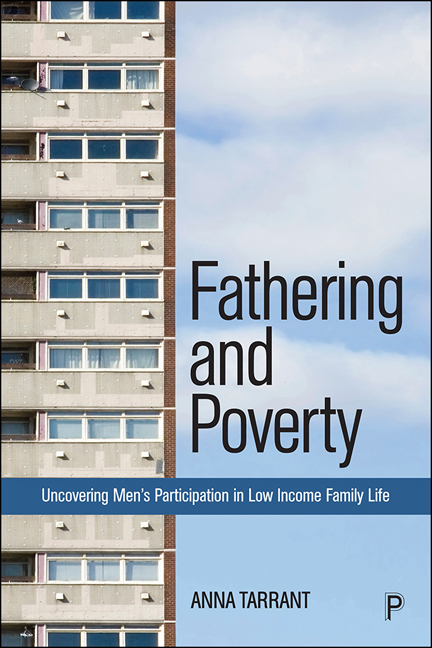Book contents
- Frontmatter
- Dedication
- Contents
- List of figures and tables
- List of abbreviations
- About the author
- Acknowledgements
- 1 Introduction: Fathering, poverty, families and policy
- 2 Low-income fatherhoods in historical and political context
- 3 Theorising men’s participation in low-income families
- 4 Supporting men in low-income contexts: practitioner observations
- 5 Men’s caring arrangements and family trajectories
- 6 Familial economic circumstances and provisioning practices
- 7 Men’s family participation in low-income urban neighbourhoods
- 8 Conclusion: Men’s family participation in low-income contexts
- Appendix A Participant information
- Appendix B ‘Existing evidence’ document shared at the knowledgeexchange workshop
- Notes
- References
- Index
3 - Theorising men’s participation in low-income families
Published online by Cambridge University Press: 30 April 2022
- Frontmatter
- Dedication
- Contents
- List of figures and tables
- List of abbreviations
- About the author
- Acknowledgements
- 1 Introduction: Fathering, poverty, families and policy
- 2 Low-income fatherhoods in historical and political context
- 3 Theorising men’s participation in low-income families
- 4 Supporting men in low-income contexts: practitioner observations
- 5 Men’s caring arrangements and family trajectories
- 6 Familial economic circumstances and provisioning practices
- 7 Men’s family participation in low-income urban neighbourhoods
- 8 Conclusion: Men’s family participation in low-income contexts
- Appendix A Participant information
- Appendix B ‘Existing evidence’ document shared at the knowledgeexchange workshop
- Notes
- References
- Index
Summary
This chapter develops the conceptual framework for the empirical chapters of the book, outlining how dynamic and temporally orientated constructions of the key themes, namely fathering, poverty and family, underscore a sociological conceptualisation and explanation of men's family participation in low-income families. Given the dearth of empirical attention to men's care responsibilities and the patterning of their family lives and participation over time in low-income contexts, it is important to elaborate these key theoretical starting points. The concept of family participation is foregrounded in this book to capture, but also widen the scope of, current academic and policy interest in the father generation and to better understand how, why and when men participate in low-income family contexts. Greater family diversity and increased opportunities for men to engage in family care over the lifecourse are linked to both structural and cultural changes and indicate the need to incorporate and account for the active family participation of other male carers, as well as fathers.
Four currently disparate yet interrelated bodies of knowledge are woven together, synthesised and considered in relation to low-income fathering. These are family diversity and dynamics; masculinities ‘in transition’; the doing of kinship and family care; and approaches to theorising low-income family life. Drawing predominantly on feminist interdisciplinary literatures, the intersections of the gendered, classed and generational power relations that shape family relationships and structures are considered as foundational to the analyses and interpretations presented.
The chapter begins with a brief overview of qualitative longitudinal research as the key theoretical paradigm in which the study findings and conceptualisation of family participation are situated.
Qualitative longitudinal research: thinking dynamically
Given its intimate connection to the Timescapes programme of research (see Chapter 1), MPLC drew on perspectives and concepts from QLR. Taking the lifecourse as the central organising framework, QLR prioritises the temporal dimensions of lived experience to grasp the nature of social change (Neale, 2019). Research in this tradition demonstrates a commitment to an examination of how and why change is created, lived and experienced by individuals and understood by them in the context of broader societal shifts (Holland and Edwards, 2014).
- Type
- Chapter
- Information
- Fathering and PovertyUncovering Men's Participation in Low-Income Family Life, pp. 55 - 78Publisher: Bristol University PressPrint publication year: 2021



